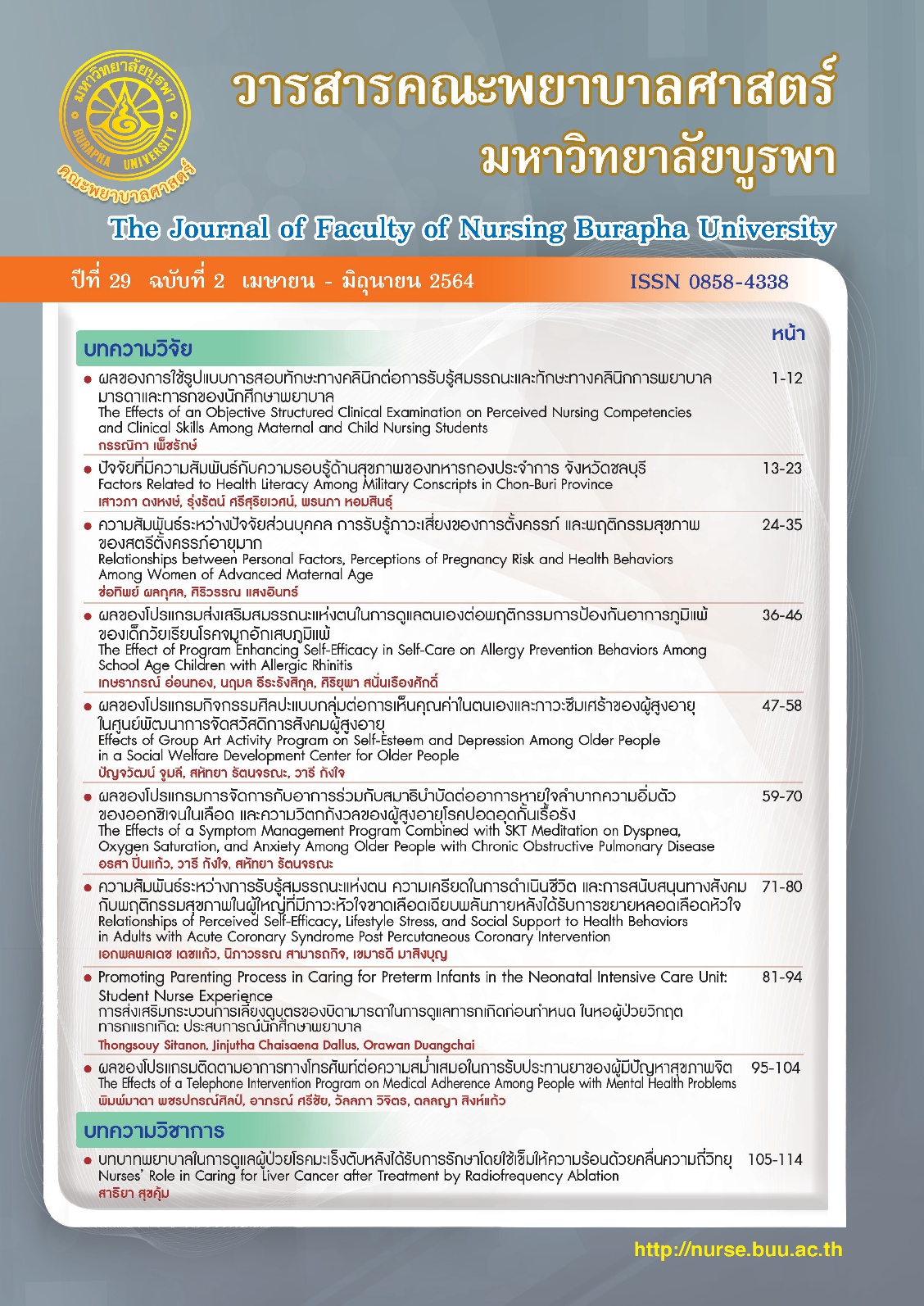ผลของโปรแกรมติดตามอาการทางโทรศัพท์ต่อความสม่ำเสมอ ในการรับประทานยาของผู้มีปัญหาสุขภาพจิต
คำสำคัญ:
โปรแกรมติดตามอาการทางโทรศัพท์, ความสม่ำเสมอในการรับประทานยา, ภาวะซึมเศร้า, ภาวะวิตกกังวล, ผู้ป่วยจิตเวชบทคัดย่อ
การวิจัยเชิงทดลองนี้ มีวัตถุประสงค์เพื่อศึกษาผลของโปรแกรมติดตามอาการทางโทรศัพท์ต่อความสม่ำเสมอ
ในการรับประทานยา, ภาวะซึมเศร้า และภาวะวิตกกังวลของผู้มีปัญหาสุขภาพจิต กลุ่มตัวอย่างเป็น ผู้มีปัญหาสุขภาพจิต
รายใหม่ที่ได้รับการวินิจฉัยว่ามีภาวะการปรับตัวผิดปกติ ภาวะวิตกกังวล และภาวะซึมเศร้า จำนวน 54 คน ที่เข้ารับ
การรักษาที่แผนกผู้ป่วยนอก ศูนย์จิตเวช ในโรงพยาบาลแห่งหนึ่ง เขตกรุงเทพมหานคร เก็บข้อมูลระหว่างเดือนตุลาคม
พ.ศ. 2563 ถึงเดือนมีนาคม พ.ศ. 2564 กลุ่มตัวอย่างได้รับโปรกรมติดตามอาการทางโทรศัพท์ทั้งสิ้นเป็นระยะเวลา
4 สัปดาห์ เครื่องมือที่ใช้ในการเก็บข้อมูลประกอบด้วย แบบสอบถามข้อมูลส่วนบุคคล ความสม่ำเสมอในการรับประทาน
ยา แบบวัดความวิตกกังวลและซึมเศร้า วิเคราะห์ข้อมูลโดยสถิติเชิงบรรยาย และสถิติทดสอบค่าที
ผลการวิจัย พบว่าภายหลังการเข้าร่วมโปรแกรมติดตามอาการทางโทรศัพท์ กลุ่มตัวอย่างมีความสม่ำเสมอในการ
รับประทานยา ภาวะซึมเศร้า และภาวะวิตกกังวลดีขึ้นกว่าก่อนเข้าร่วมโปรแกรมอย่างมีนัยสำคัญทางสถิติ .05 จึงมี
ข้อเสนอแนะให้พยาบาลนำโปรแกรมนี้ไปใช้เป็นแนวทางในการติดตามอาการของผู้ป่วยจิตเวชรายอื่น ๆ เพื่อส่งเสริมให้
ผู้ป่วยจิตเวชรับประทานยาสม่ำเสมอ ลดภาวะซึมเศร้า และภาวะวิตกกังวล
เอกสารอ้างอิง
Bressington, D., Mui, J., & Gray, R. (2013). Factors associated with antipsychotic medication adherence in community-based patients with schizophrenia in Hong Kong: A cross sectional study. International Journal of Mental Health Nursing, 22(1), 35-46.
Buranakunkitkan, S., Chaisena-Dallas, J., Hengudomsub, P., & Pratoomsri, W. (2018). Relationships between protective factors and resilience among schizophrenia caregivers. Nursing Journal of the Ministry of Public Health, 28(1), 24-35. [In Thai]
Duangjai P. (2013). Effects of self-management promotion program on medication adherence among older adults with chronic kidney dissease. Master of Nursing Science Thesis, Faculty of Nursing, Burapha University. [In Thai]
Ekakul, T. (2006). Research methodology in behavioral sciences and social sciences. Ubon Ratchathani, Wttaya offset printing [In Thai]
Exbrayat, S., Coudrot, C., Gourdon, X., Gay, A., Sevos, J., Pellet, J., Trombert-Paviot, B., & Massoubre, C. (2017). Effect of telephone follow-up on repeated suicide attempt in patients discharged from an emergency psychiatry department: a controlled study. BMC psychiatry, 17(1), 1-6. DOI: 10.1186/s12888-017-1258-6
Kanfer, F. H., & Gaelick-Buys, L. (1991). SeIfManagement methods. In F. H. Kanfer & A. P. Goldstein(Eds), SeIf-management methods in helping people changes: A textbook of methods (4th ed.). (pp 305-360). New York: Pergamon Press.
Lortrakul M., & Sukanich, P., (2009). Ramathibodi Essential Psychiatry 3th edition. Bangkok: Faculty of medicine Ramathibodi hospital.
Morisky, D. E., Ang, A., Krousel-Wood, M., & Ward, H. (2008). Predictive validity of a medication adherence measure for hypertension control. Journal of Clinical Hypertension, 10, 348-354. Retrieved from: https://escholarship.org/uc/item/3m37z2jc
McAllister, M., & McKinnon, J. (2009). The importance of teaching and learning resilience in the health disciplines: A critical review of the literature. Nurse education today, 29(4), 371-379. DOI: 10.1016/j.nedt.2008.10.011
Nilchaikovit, T. Lortrakul, M., Phisansuthideth, U., (1996). Development of Thai version of hospital anxiety and depression scale in cancer patients. Journal Psychiatric Association of Thailand, 41(1), 18-30. [In Thai]
Novick, D., Haro, J. M., Suarez, D., Perez, V., Dittmann, R. W., & Haddad, P. M. (2010). Predictors and clinical consequences of non-adherence with antipsychotic medication in the outpatient treatment of schizophrenia. Psychiatry research, 176(2-3), 109-113. DOI: 10.1016/j.psychres.2009.05.004
Prasartkaew, N., Terahongkum, S., & Maneesriwongkul W. (2012). The effect of a home visit and telephone follow-up program on health beliefs and blood pressure in persons with uncontrolled hypertension. J Public health, 42(3), 19-31. [In Thai]
Phongam, R., Aungauroch, Y., & Sukrakul, S. (2019). The effect of therapeutic relationship combined with telephone continuing care program on medical adherence in persons with schizophenia. Royal Thai Navy Medical Journal, 45(3), 493-508. [In Thai]
Psychiatric Depatment monthly report (January). (2020). Bangkok: Paolo hospital.
Puengdokmai, P., Charoenkitkan V., Pinyopasakul., Sriprasong S., & Dumavibhal C., (2016). Factors influencing medication adherence in hypertensive patients without complications. Princess of Naradhiwas University Journal, 8(1), 16-26. [In Thai]
Purivatanakul, N., Tipmongkol, V., & Wongleang, K. (2007). Effects of a telephone education program on self-care behavior for rehabilitative fractured femur patients. Songklanagarind Medical Journal, 25(1), 19-27. [In Thai]
Scheier, M. F., Weintraub, J. K., & Carver, C. S. (1986). Coping with stress: Divergent strategies of optimists and pessimists. Journal of Personality and Social Psychology, 51(6), 1257-1264.
Stuart, G. W., & Sundeen, S. J. (2009). Principles and practice of psychiatric nursing (9th ed.). St. Louis: Elsevier.





